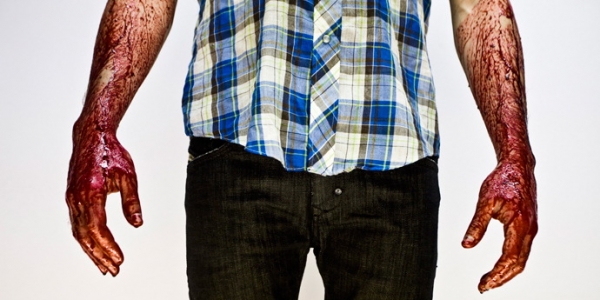“I’ve been really happy with [the response to Cells]. And I’ve also quite enjoyed that some tunes have thrown a few people,” Keating says. “There’s definitely head scratching moments, which is part of the fun, I think; you’ve always got to be pushing people in weird directions to make it more interesting,” he says.
Keating has been wilfully defying expectations since he first emerged almost 20 years ago as a member of hip hop and electronic music duo The Wiseguys. After also releasing music as DJ Touché and The Black Ghosts (a collaboration with former Simian vocalist Simon Lord), Keating’s Fake Blood alter ego first emerged in 2007 for what was supposed to be a one-off remix of one of his own tracks – The Black Ghosts’ Any Way You Choose to Give It.
However, requests for Fake Blood remixes soon followed, and buzz around the project grew. When Keating released Fake Blood’s first original song in late 2008, Mars, it became one of the year’s biggest club anthems – and led to much speculation about Fake Blood’s identity. This wasn’t a stunt on Keating’s part, though; he simply wanted people to focus on the music. In early 2009, he revealed to Mixmag that he was the man behind Fake Blood.
“All of that stuff, none of that was engineered; there was no PR, no management – that was just me doing nothing,” Keating says. “It was a good laugh but I had to stop it at a point where, I didn’t want it to become the defining thing, like a gimmick. It was just, ‘Okay, enough of that now’. I had to make it more about the tunes.”
A number of EPs, singles and remixes followed over the next few years, leading to the release of Cells in November. “I think it just felt like the right time, because I’ve done three EPs and a bunch of remixes, and people were familiar with me and my sound,” Keating says. “As I was doing that, I kind of had these other ideas for tracks and things that, I think, it felt I needed an album to show these slightly darker ideas… I think at this point it was like, ‘Well, people kind of know me, or think they know me, so now it’s time to mess with that a little bit’.”
Although singles like Yes / No and All In The Blink are up-tempo dance floor pleasers, Cells is a menacing album at times, with Keating’s darker ideas manifested on sinister synth-heavy songs like London and Phantom Power. Listening to the album, it’s not surprising that one of the projects he was working on at the same time was an alternate soundtrack for cult horror film Suspiria.
Keating’s no stranger to horror – his godfather, Alan Gibson, directed episodes of the legendary Hammer Studio’s House of Horror television show, and he was exposed from a young age. “I remember as a kid, one of his things was on TV and I wanted to watch it, so my mum and dad said, ‘Yeah, you can watch it’, but they were a bit uncertain whether it was appropriate, because I was only eight,” Keating says. “It terrified the crap out of me, and I’ve never forgotten it. I guess it also sparked that initial interest.”
This interest enabled him to branch out on Cells. “I think with an album, the whole point is you don’t just play it safe. You don’t just do ten songs that follow a formula that you know is time-tested or you know is going to work. The whole point of an album is you have this space there to try other things out and to experiment or to try ideas and take a few risks,” he says. “Why not have fun and experiment or do some other stuff, show other sides of what you’re into? I think that’s part of the fun, and in doing that, sometimes you can throw people, but it’s up to you.”
After he finished Cells in October, Keating took a short break, but quickly returned to the studio to work on what he describes as the “seeds of what could be Black Ghost tracks”, as well as a few remixes and a song for his next EP. “I can’t take breaks for very long because I start going a bit crazy,” he says. “You never stop, you just take your foot slightly off the gas, and then you want to get back into it.”
Keating’s open-minded approach to his work in the studio also extends to his DJ sets. He says that he believes DJs have a responsibility to use their platform to expose audiences to new music – rather than just the hits they can hear in any given club on any given weekend.
“I just want to play the best music, and play music that you might not know. I wanna play those tracks that you think ‘where the hell is he getting this music?’ The tracks that you’ll hear tomorrow,” he says. “Each set I play is completely different to the one before… I decide what I’m going to play when I’m standing there, looking at the people in front of me. It’s very much a spontaneous DJ set, as it should be – responding to the crowd and having fun and taking risks.”
BY JOSHUA HAYES

